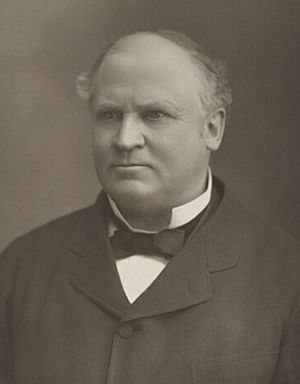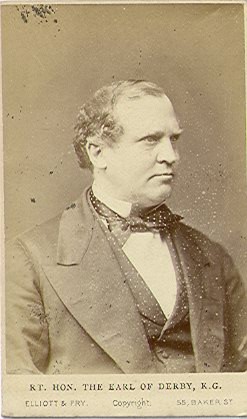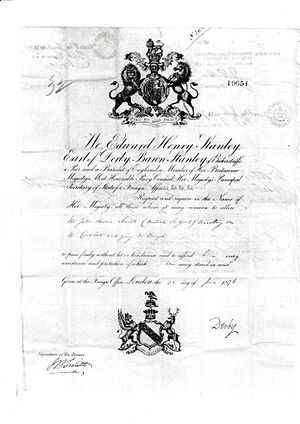Edward Stanley, 15th Earl of Derby facts for kids
Quick facts for kids
The Earl of Derby
|
|
|---|---|

The 15th Earl of Derby, c. 1891
|
|
| Secretary of State for the Colonies | |
| In office 16 December 1882 – 9 June 1885 |
|
| Monarch | Victoria |
| Prime Minister | William Ewart Gladstone |
| Preceded by | The Earl of Kimberley |
| Succeeded by | Frederick Stanley |
| In office 26 February 1858 – 5 June 1858 |
|
| Monarch | Victoria |
| Prime Minister | The Earl of Derby |
| Preceded by | Henry Labouchere |
| Succeeded by | Edward Bulwer-Lytton |
| Secretary of State for Foreign Affairs | |
| In office 21 February 1874 – 2 April 1878 |
|
| Monarch | Victoria |
| Prime Minister | Benjamin Disraeli |
| Preceded by | The Earl Granville |
| Succeeded by | The Marquess of Salisbury |
| In office 6 July 1866 – 9 December 1868 |
|
| Monarch | Victoria |
| Prime Minister | The Earl of Derby Benjamin Disraeli |
| Preceded by | The Earl of Clarendon |
| Succeeded by | The Earl of Clarendon |
| Secretary of State for India | |
| In office 2 August 1858 – 11 June 1859 |
|
| Preceded by | Office established (himself as the President of the Board of Control) |
| Succeeded by | The Viscount of Halifax |
| President of the Board of Control | |
| In office 5 June 1858 – 2 August 1858 |
|
| Preceded by | The Earl of Ellenborough |
| Succeeded by | Office abolished (himself as the Secretary of State for India) |
| Parliamentary Under-Secretary of State for Foreign Affairs | |
| In office 18 May 1852 – 28 December 1852 |
|
| Monarch | Victoria |
| Prime Minister | The Earl of Derby |
| Preceded by | Austen Henry Layard |
| Succeeded by | The Lord Wodehouse |
| Member of the House of Lords Lord Temporal |
|
| In office 24 October 1869 – 21 April 1893 Hereditary Peerage |
|
| Preceded by | The 14th Earl of Derby |
| Succeeded by | The 16th Earl of Derby |
| Member of Parliament for King's Lynn |
|
| In office 1848 – 1869 Serving with Robert Jocelyn, John Henry Gurney Sr. and Sir Fowell Buxton, 3rd Baronet |
|
| Preceded by | Lord George Bentinck |
| Succeeded by | Lord Claud Hamilton |
| Personal details | |
| Born | 21 July 1826 |
| Died | 21 April 1893 (aged 66) |
| Nationality | British |
| Political party | Conservative |
| Spouses | Lady Mary Sackville-West (m. 1870; his death 1893) |
| Parents | Edward Smith-Stanley, 14th Earl of Derby Emma Caroline Bootle-Wilbraham |
| Alma mater | Trinity College, Cambridge |
Edward Henry Stanley, 15th Earl of Derby, born on 21 July 1826, was an important British politician. He was known as Lord Stanley until 1869. He served as a top government official, holding roles like Secretary of State for Foreign Affairs and Colonial Secretary multiple times. He was the son of a Prime Minister and played a big part in British politics during the Victorian era. He passed away on 21 April 1893.
Contents
Early Life and Education
Edward Henry Stanley was born into one of England's wealthiest landowning families. His father, Edward Smith-Stanley, 14th Earl of Derby, was a very important politician. He led the Conservative Party and served as Prime Minister three times. Edward's mother was Emma Caroline Bootle-Wilbraham.
Edward had a younger brother named Frederick Arthur Stanley. You might know Frederick's name because the famous NHL's Stanley Cup is named after him!
Edward went to excellent schools. He studied at Eton, Rugby, and then Trinity College, Cambridge. At Cambridge, he excelled in classics and joined a special group called the Cambridge Apostles.
Starting His Political Career
Edward Stanley began his political journey in March 1848. He tried to become a Member of Parliament (MP) for Lancaster but didn't win that time. After this, he traveled a lot, visiting places like the West Indies, Canada, and the United States.
While he was away, he was elected as an MP for King's Lynn. He represented this area until 1869, when he became an Earl. As an MP, he joined the Conservatives. His first major speech in Parliament was in May 1850, about sugar taxes.
In 1852, he traveled to India. While there, he was appointed as an under-secretary for foreign affairs in his father's government. He also became a captain in the 3rd Royal Lancashire Militia in 1853.
Changing Political Views
Early in his career, Edward was seen as more open to Liberal ideas than most Conservatives. In 1855, Lord Palmerston, who was Prime Minister, offered him a job as Secretary of State for the Colonies. Edward was very interested, but his father, the Conservative leader, didn't approve, so he turned down the offer.
In his father's second government, Edward first served as Colonial Secretary in 1858. Later that year, he became the President of the Board of Control. He was in charge of the India Bill of 1858 in Parliament. This bill changed how India was governed by Britain. He then became the very first Secretary of State for India, earning a great reputation for his work.
There was even a time when some people thought he might become the King of Greece! After King Otto left the throne, the Greek people wanted Queen Victoria's son, Prince Alfred, to be their king. When Prince Alfred declined, some considered a wealthy English nobleman like Lord Stanley. However, he was never formally offered the crown.
Foreign Minister: 1866-1868
In 1866, when the government changed, Edward became the Secretary of State for Foreign Affairs in his father's third government. In this role, he focused on keeping Britain out of unnecessary conflicts. He described his approach as like a person floating down a river, trying to avoid obstacles.
He famously described Britain's foreign policy in 1866 as "Splendid isolation". This meant that Britain should:
- Be friendly with all countries.
- Avoid making special alliances with any one country.
- Try not to get involved in other countries' internal problems.
He helped arrange an agreement in 1867 to protect the neutrality of Luxembourg. This was important because France and Prussia were becoming more likely to go to war. He also worked on an agreement with the USA about the CSS Alabama ship, though it wasn't officially approved. He chose not to get involved in problems in Crete.
Foreign Minister: 1874-1878
In 1874, he again became Foreign Secretary, this time in Benjamin Disraeli's government. During this period, a major event was Britain's purchase of controlling shares in the Suez Canal Company in 1875. This was a bold move that proved very successful for Britain.
He also played a part in negotiations that led to Russia giving up some land gains in the Balkans. Britain gained control of Cyprus from the Ottoman Empire, which became an important naval base.
Lord Derby resigned from his role in January 1878. He resigned again later that year when the government decided to call up military reserves.
Later Political Life
By October 1879, it became clear that Edward Stanley was moving towards the Liberal Party. He officially announced this change in March 1880. He joined William Ewart Gladstone's government in December 1882 as Colonial Secretary. He held this position until the government fell in 1885.
In 1886, the Liberal party split. Lord Derby joined the Liberal Unionist group. He was an active leader for this group in the House of Lords until 1891. In 1892, he led a special commission that looked into labor issues.
He also held an honorary military position as Honorary Colonel of the 1st Lancashire Rifle Volunteer Corps starting in 1870.
Personal Life
Lord Derby married Lady Mary in 1870. She was the daughter of George Sackville-West, 5th Earl De La Warr and the widow of James Gascoyne-Cecil, 2nd Marquess of Salisbury. They did not have any children together.
Edward's health declined after he got influenza in 1891. He passed away at Knowsley Hall on 21 April 1893, at the age of 66. His younger brother, Frederick, became the next Earl. Lady Derby died in December 1900.
Images for kids
 | Kyle Baker |
 | Joseph Yoakum |
 | Laura Wheeler Waring |
 | Henry Ossawa Tanner |






